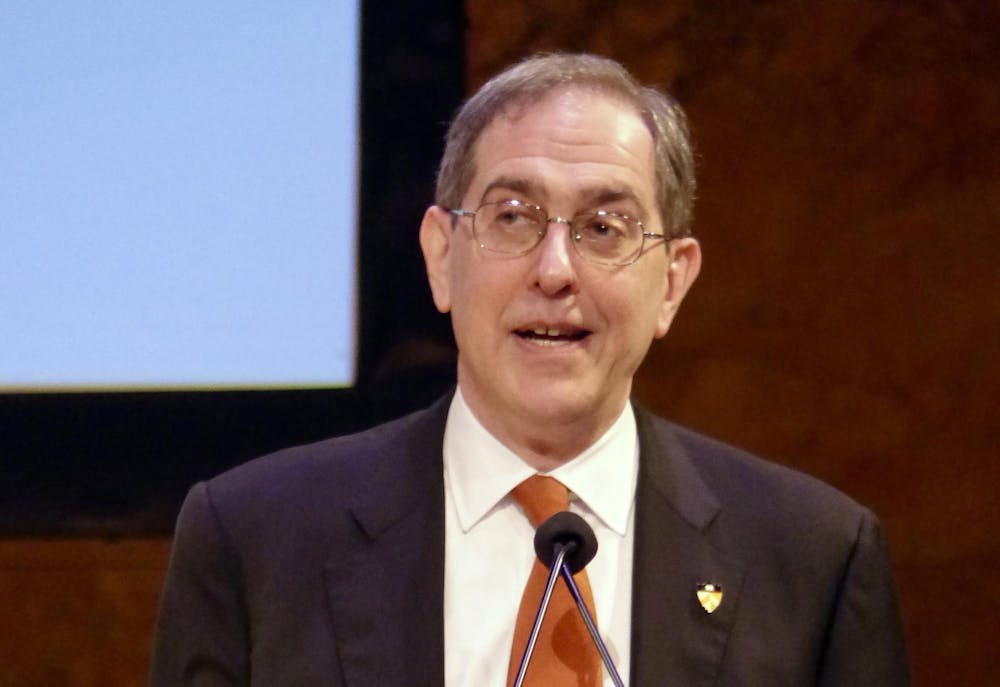University President Christopher Eisgruber ’83 appeared on C-SPAN on Wednesday for a 30-minute segment as part of his role as the newly-elected chair for the board of the Association of American Universities (AAU), a group representing 70 top research universities.
In a wide-ranging conversation, Eisgruber discussed the state of higher education, sharing his views on the boycott, divest, sanction (BDS) movement, the price of college, and the function of financial aid.
Eisgruber, who spoke from DC, addressed a new House bill which would cut off federal student aid to universities engaging in a commercial boycott of Israel directed by the BDS movement. The bill was introduced last week by Reps. Virginia Foxx (R-N.C.) and Josh Gottheimer (D-N.J.).
“Both I and the AAU have strongly opposed the idea of boycotts, in general,” Eisgruber said. He pointed to a statement he made in 2013, the first year of his presidency, opposing the academic boycott of Israel by the American Studies Association.
A University spokesperson was unable to respond to a request clarifying if Eisgruber’s comment intended to refer to boycotts, in broad terms, by publication time.
The University, however, has previously participated in divestment practices.
In 1987 and 2007, it divested companies complicit in South African apartheid and the genocide in the Darfur region of Sudan, respectively. Most recently, in 2022, the University dissociated from several fossil fuel companies, but partly walked back its commitment to reinstate access to research funds.
“It is important for us to be interacting with other institutions around the world,” Eisgruber continued. “[W]ith regard to these issues around what I would call institutional restraint, I just don’t think it is appropriate for the university to be engaging in those kinds of actions,” Eisgruber continued.
At various points in the television segment, he reiterated his and the University's practice of institutional restraint, the principle that universities are not neutral but instead value-laden institutions that can take positions in rare cases concerning the core values of the University.
Earlier this fall, Eisgruber told The Daily Princetonian that he would not consider institutional neutrality. Multiple other Ivy League universities have adopted institutional neutrality following highly polarizing Pro-Palestine protests in the spring semester.
Eisgruber also expressed concern over the prospect of Congress cutting off federal student aid in response to boycotts.
“I also think there is a huge danger if Congress starts picking out particular issues and saying, with regard to these universities that make such a difference in the world,” he said, “look, we are going to pick on ‘this political issue’ or ‘that political issue’ and use it as a reason to start cutting off aid.”

“That ultimately makes these institutions more affordable and enables them to do the research on which our country depends,” Eisgruber said.
Several questions, lobbied by viewer call-ins and the show, honed in on the affordability of college and the “merit” of the investment. Eisgruber defended rising sticker prices by arguing that costs were actually offset by financial aid.
“Princeton has 71 percent of its students on financial aid,” he explained. “That is because we are spending our endowments on financial aid.”
“People sometimes think they’re saving accounts that sit off to the side. They’re not that,” he continued. “They’re like annuities, like retirement.”
Currently, the University pulls out 5.3 percent of its endowment, he said, to finance its operating budget. During his tenure, Princeton’s financial aid policy has expanded significantly, with most families making up to $100,000 a year now having to pay no family contribution.
In his State of the University letter published in January, Eisgruber stated that the expansion of the financial aid policy was critical to making Princeton accessible to talented students of all socioeconomic backgrounds.
“Financial barriers also discouraged brilliant students from attending Princeton and its peers in decades past,” Eisgruber wrote.
Yet Eisgruber was hesitant to endorse making college tuition completely cost-free for everyone on Wednesday.
“I don’t believe in free tuition for all,” Eisgruber said. “There are some people who are able to afford to make this extraordinary investment in college education. It is a good thing for people to do.”
Eisgruber’s overall message provided a decisively positive view of higher education today.
“I think the current state of higher education is terrific in the United States,” he concluded. “For many families, that investment in higher education will be the best investment that they make in their lifetimes.”
Eisgruber will appear publicly again on Monday at the next meeting of the Council of the Princeton University Community.
Correction: This piece has been updated to fix minor quote transcription errors.
Bridget O’Neill is a head News editor for the ‘Prince’ from Palm Beach Gardens, Fla. who typically covers the University administration.
Miriam Waldvogel is an associate News editor and the investigations editor for the ‘Prince.’ She is from Stockton, Calif. and often covers campus activism and University accountability.
Please send any corrections to corrections[at]dailyprincetonian.com.








